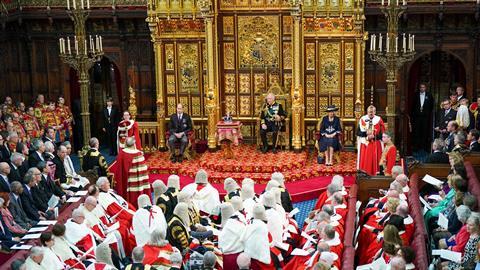The government will introduce a Bill of Rights to ‘restore the balance of power between the legislature and the courts’ and a Brexit Freedoms Bill to allow retained EU law to be ‘more easily amended’, it was announced today.
An expected overhaul of the Human Rights Act, which the government says will curb ‘the incremental expansion of a rights culture without proper democratic oversight’, was one of 38 pieces of legislation announced in the Queen’s speech.
Lord chancellor Dominic Raab said the bill ‘will strengthen our traditions of liberty, particularly the right to free speech, while adding a healthy dose of common sense and curtailing abuses of the system’.
But Law Society president I. Stephanie Boyce said: ‘The Human Rights Act confirms and protects the rights and freedoms of people in the UK and provides robust protection in British courts.
‘Dismantling it will have far-reaching consequences, conferring greater unfettered power not just on the government of today, but also on future ruling parties, whatever their ideology.
‘If the new Bill of Rights becomes law, it would make it harder for all of us to protect or enforce our rights. The proposed changes make the state less accountable. This undermines a crucial element of the rule of law, preventing people from challenging illegitimate uses of power.’
Mark Fenhalls QC, chair of the Bar Council, said that ‘the litmus test of a remodelled Bill of Rights is whether it will provide coherent, readily applicable remedies’, while Fiona Rutherford, chief executive of JUSTICE, said the organisation is concerned the speech ‘indicates an unnecessary and counterproductive use of parliamentary time to the detriment of human rights in the UK’.
The Brexit Freedoms Bill is intended to ‘end the supremacy of European law’ by ensuring EU law can be ‘amended, repealed or replaced with legislation which better suits the UK, without this taking decades of parliamentary time to achieve’.
However, Fenhalls warned that the proposed legislation ‘could involve the unpicking of decades of legislation’ and said that ‘any steps taken must be considered very carefully to avoid unintended consequences that could damage the interests of the United Kingdom’.
The speech also featured plans for an Economic Crime and Corporate Transparency Bill to ‘crack down on the kleptocrats, criminals and terrorists who abuse our open economy, ensuring we drive out dirty money from the UK’.
There will also be a Public Order Bill, which appears designed to target protest movements such as Extinction Rebellion and Insulate Britain by introducing new criminal offences of locking-on and going equipped to lock-on, and extending stop and search powers for ‘protest-related offences’.
Boyce said: ‘If the government is serious about tackling crime it must implement the recommended 15% increase in criminal legal aid fees to ensure the survival of a functioning criminal justice system.
‘Without that bare minimum, court backlogs will inevitably endure, solicitors will continue to leave the profession in droves, and we will no longer have a criminal justice system worthy of the name.’
However, there was no mention of the long-awaited Employment Bill, first promised by the government at the end of 2019. Sophie Vanhegan, a partner at employment law specialists GQ|Littler, said the latest delay ‘inevitably leads to continued uncertainty for employers, who have been unable to determine whether their policies and practices need to be updated in readiness for the proposed changes’.
This article is now closed for comment.




























10 Readers' comments